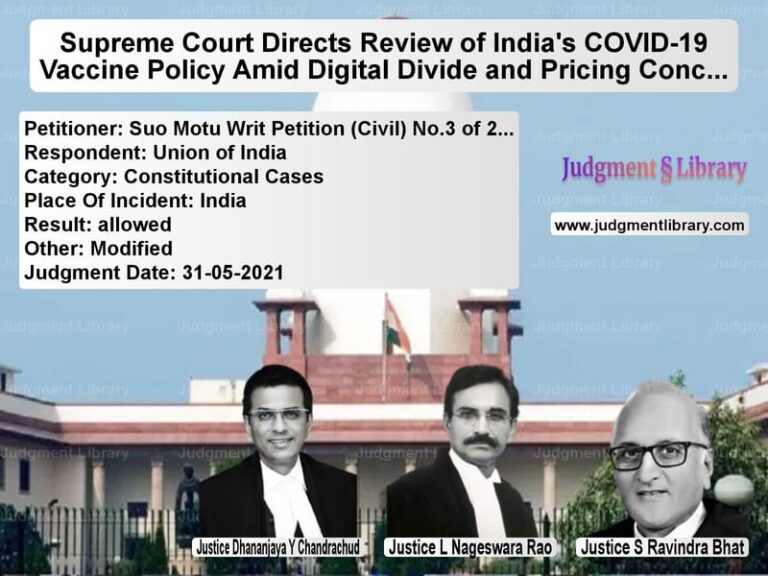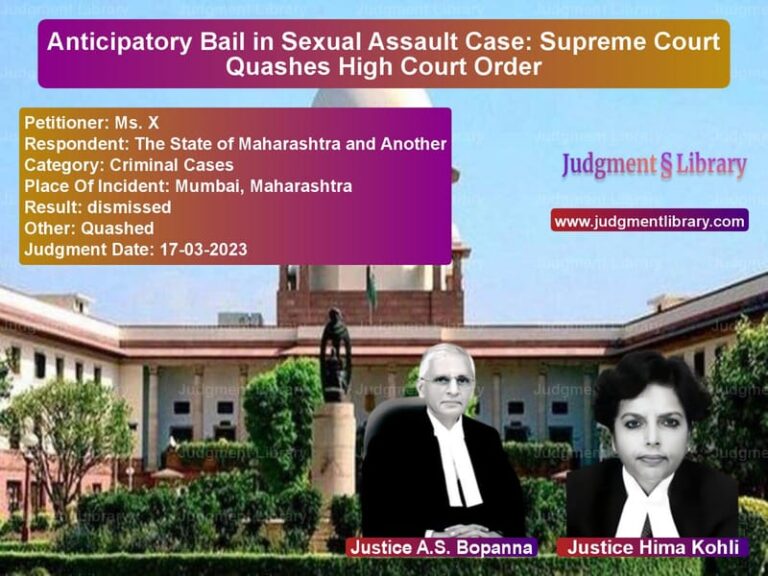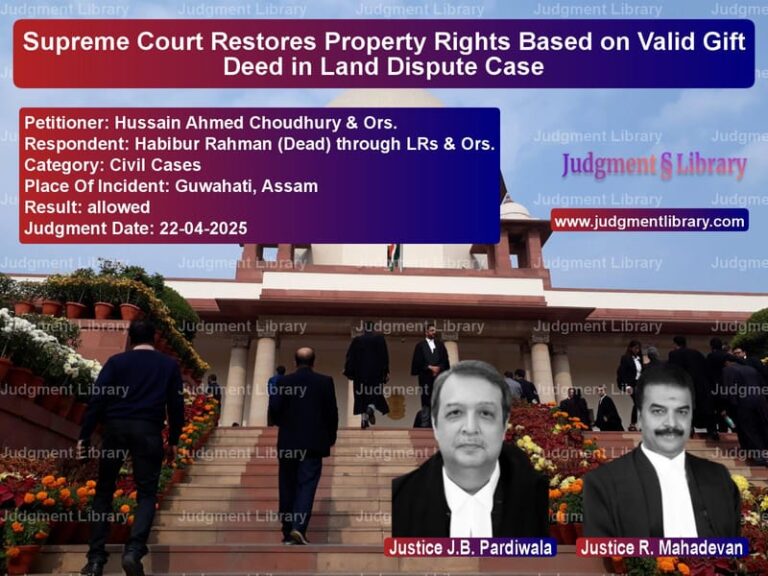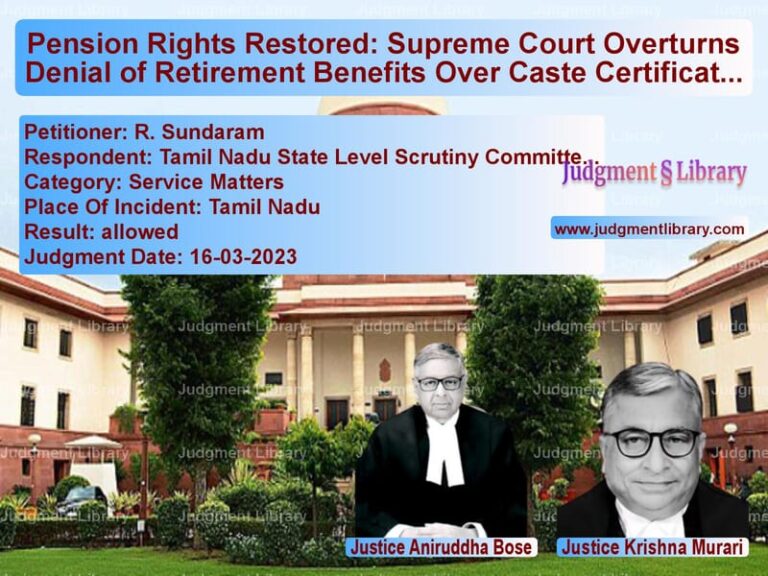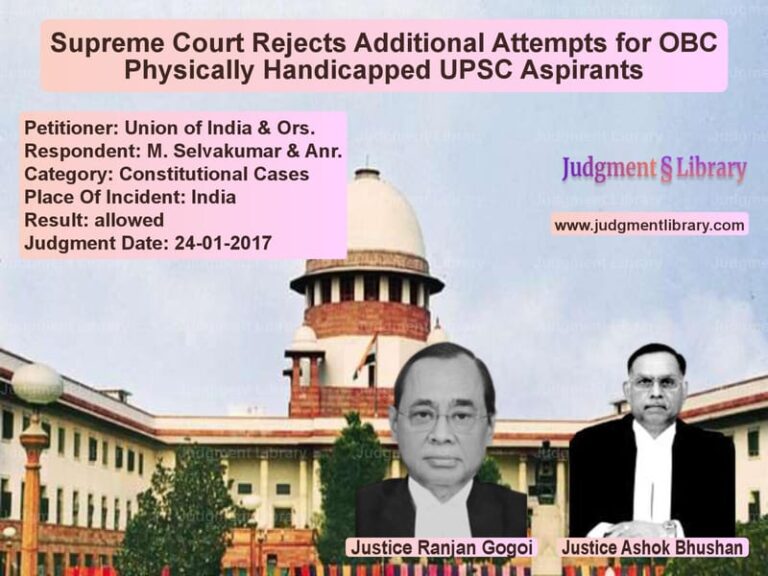Consumer Rights Upheld: Supreme Court Orders HUDA to Reallot Plot at Prevailing Rates
The case of Pardeep Sharma v. Chief Administrator, Haryana Urban Development Authority (HUDA) is a significant ruling on consumer rights in real estate disputes. The Supreme Court ruled in favor of the appellant, directing HUDA to allow him to retain the allotted plot at prevailing market rates. The judgment highlights the principles of fairness in land allotment and the responsibilities of development authorities.
Background of the Case
The appellant, Pardeep Sharma, was allotted Plot No. 1048 in Sector 64, Faridabad, measuring 250 square yards, at the rate of Rs. 1,865 per square yard through Memo No. 399 dated January 1, 2001. He paid:
- 10% as earnest money along with the application.
- 15% of the sale consideration on January 22, 2001.
- The remaining 75% was to be paid in six yearly installments with 15% interest per annum.
However, HUDA later issued a demand notice asking the appellant to pay an additional Rs. 59,782.50 due to an enhancement in the cost of the plot. The appellant refused to pay, leading to HUDA not delivering possession of the plot.
Consumer Complaint and District Forum’s Order
Feeling aggrieved, the appellant filed a complaint before the District Consumer Disputes Redressal Forum, Faridabad, arguing that HUDA failed to deliver the plot, causing him financial and mental distress. He sought a direction for HUDA to hand over possession while adjusting the amount already paid.
During the case proceedings, HUDA refunded the amount paid by the appellant, which he accepted. However, this refund was not disclosed to the District Forum, which, on December 19, 2005, ruled in favor of the appellant, directing:
- HUDA to reallot the same plot at the original price.
- The amount already paid to be adjusted against the plot price.
- HUDA to pay Rs. 50,000 as compensation for mental agony and harassment.
- HUDA to pay Rs. 5,000 as litigation expenses.
Appeal Before the State Commission
HUDA challenged the District Forum’s order before the State Consumer Disputes Redressal Commission, Haryana, arguing:
- The appellant had voluntarily accepted the refund.
- Once a refund is accepted, the appellant ceases to be a consumer.
- Since the plot was surrendered, the complaint should not have been entertained.
The State Commission, in its order on December 2, 2010, set aside the District Forum’s decision, ruling that the appellant had no claim over the plot after accepting the refund.
National Consumer Commission’s Order
The appellant then filed a Revision Petition (No. 671/2011) before the National Consumer Disputes Redressal Commission, New Delhi. The National Commission, on July 19, 2011, dismissed the petition, upholding the State Commission’s findings.
Appeal Before the Supreme Court
The appellant challenged the decisions of the lower commissions before the Supreme Court, arguing:
- He had deposited the full sale consideration and obtained a DPC (Detailed Plan Completion) certificate after constructing a building on the plot.
- The cancellation of his allotment and refund of his payment were done without providing a hearing, making the action arbitrary.
- Despite receiving possession, the authorities continued to challenge his ownership.
HUDA’s Arguments
HUDA defended its actions, arguing:
- The refund had been accepted, terminating the appellant’s rights.
- He ceased to be a consumer after taking back his money.
- Possession was delivered under execution proceedings, not under valid ownership.
Supreme Court’s Analysis and Judgment
1. Validity of Possession and Refund
The Supreme Court noted that possession of the plot was handed over to the appellant during execution proceedings. It observed:
“The appellant accepted the refund under duress, believing it was the only option available at the time. This does not invalidate his claim to the plot.”
2. Lack of Coordination in HUDA
The Court criticized HUDA for administrative lapses, stating:
“There was utter confusion and lack of communication within HUDA. Different sections acted without knowledge of each other’s actions, leading to contradictory decisions.”
3. Direction for Inquiry Against HUDA Officials
The Court ordered an inquiry into how:
- Possession was granted despite ongoing litigation.
- The appellant obtained a ‘No Encumbrance Certificate’ and DPC approval.
- Sanction was given for building construction.
The Court stated:
“The Chief Administrator, HUDA, shall conduct an inquiry and identify officials responsible for lapses, ensuring corrective action is taken.”
4. Permitting Retention of the Plot
Given that the appellant had already constructed a house, the Supreme Court ruled:
“In the interest of justice, the appellant shall be allowed to retain the plot upon payment of the prevailing HUDA rate, i.e., Rs. 10,500 per square meter.”
Final Judgment
The Supreme Court ruled:
- HUDA shall allow the appellant to retain the plot upon paying Rs. 10,500 per sq. meter, adjusting the amount already deposited.
- The payment must be made within four months.
- Upon payment, HUDA must execute ownership documents and issue necessary clearances.
- HUDA shall proceed with disciplinary action against erring officials.
Key Takeaways
- Even after a refund, a consumer may have rights if possession was granted later.
- Government authorities must ensure transparency in allotments.
- Administrative lapses must be corrected through accountability measures.
- The Supreme Court prioritizes fairness over technicalities.
Conclusion
The judgment in Pardeep Sharma v. HUDA reinforces consumer rights in property disputes. The Supreme Court’s decision ensures that an individual is not deprived of ownership due to bureaucratic inefficiencies. The ruling sets an important precedent in cases of land allotment irregularities.
Don’t miss out on the full details! Download the complete judgment in PDF format below and gain valuable insights instantly!
Download Judgment: Pardeep Sharma vs Chief Administrator, Supreme Court of India Judgment Dated 07-01-2016.pdf
Direct Downlaod Judgment: Direct downlaod this Judgment
See all petitions in Property Disputes
See all petitions in Landlord-Tenant Disputes
See all petitions in Specific Performance
See all petitions in Judgment by T.S. Thakur
See all petitions in Judgment by R. Banumathi
See all petitions in allowed
See all petitions in Modified
See all petitions in supreme court of India judgments January 2016
See all petitions in 2016 judgments
See all posts in Civil Cases Category
See all allowed petitions in Civil Cases Category
See all Dismissed petitions in Civil Cases Category
See all partially allowed petitions in Civil Cases Category


